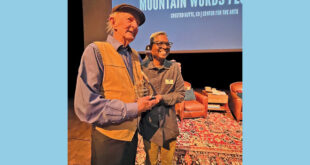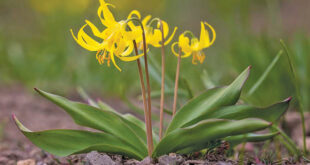Winter and its snows lingered much longer this year in the valley but already the rows of garden vegetables are tall and proud in happy shades of greens, purples and deep reds and the magic underground has begun its journey to bountiful summer eating and fall harvests.
Alec Solimeo leases 38 acres on Roaring Judy Ranch up Jack’s Cabin Road, where he grows organic produce and raises chickens and turkeys that he offers shares to the public for farm-to-family food. He also raises goats and this year he bought his first pigs.
Father to three children, Solimeo had a plan to grow enough food to feed his family but he points out that farming is an expensive endeavor and to make it break even, you need to factor in produce sales, partners in the form of consumers who will buy into your product.
It is that latter fact that has re-energized the small-farm culture and helped sustain older farms in many areas of the country. Many more people have become aware of the benefits of fresh food direct from the grower. Solimeo’s options to the public now range from eggs to green produce to white meat (both pig and chicken).
Bio-regional dietician on the
Big Kids Farm
Although Alec admits that it’s easy to feed yourself by going to the grocery store, for the past four years he’s struggled to embrace the concept of a locally based diet through raising and growing his own produce and livestock. He confesses that it’s an astronomical challenge. He considers himself striving to become a “bio-regional dietician.” Most of the 38 acres are animal space with about an acre of garden.
The well-known Gunnison valley climate is an extra challenge for producing enough food in so short a time between first and last frosts. Historically, the Jack’s Cabin area had the largest potato producing farm in the county in late 1800s, filling up train cars with potatoes, according to Solimeo. It’s one of the crops he now grows, along with a large selection of greens—from kales to head lettuces to leaf lettuces, cabbages, onions, scallions, leeks, beets and carrots.
Indeed, the discovery of farming itself created the roots of modern civilization around 12,000 years ago when people were nomadic hunters and gatherers. Because crops and animals could now be farmed and raised to provide a sure food supply, people settled into permanent places. The world population exploded, cities grew, civilizations expanded and the planet went from five million humans to over seven billion in 10,000 years, all because of farming.
Cattle farming started in the very fertile areas of Turkey, Iraq and southwestern Iran 10,000 to 13,000 years ago with goats, pigs and sheep and as it moved westward, it revolutionized the European Stone Age with a dramatic DNA impact. Before dairy faming came to Europe, those populations weren’t able to digest raw cow’s milk. But at some time during the farming development a genetic mutation changed the lactose intolerance and that DNA continued to spread through the human population through natural selection.
Solimeo moved to Colorado from New Jersey in 2002, escaping from the September 11, 2001 trauma. He and his wife, Cassie Mauney, spent three years homesteading in the foothills of the Fossil Ridge wilderness in Gunnison County, but void of water, farming was sketchy having to rely on a well. They decided to lease the land at Roaring Judy Ranch.
His children are “farm educated” through experience— they gather their own eggs, plant seeds, tend to the garden, but their favorite farm activity is finding worms to bring to the vegetable beds.
Big Kids Farm practices the use of permaculture, which is, according to Bill Mollison, the noted father of the permaculture concept, “A philosophy of working with, rather than against nature; of protracted and thoughtful observation rather than protracted and thoughtless labor; and of looking at plants and animals in all their functions, rather than treating any area as a single product system.”
Its core tenets are, “Care for the earth: Provision for all life systems to continue and multiply. This is the first principle, because without a healthy earth, humans cannot flourish. Care for the people: Provision for people to access those resources necessary for their existence. Return of surplus: Reinvesting surpluses back into the system to provide for the first two ethics. This includes returning waste back into the system to recycle into usefulness.”
Currently, Solimeo is enrolled at WSCU in their master of environmental management program. He feels that humans need to create a sustainable permanent agricultural system and says, “It’s mainly about spending enough time with nature to be able to read the signs shown and be capable to adjust accordingly to work with nature. This year we’re farming for ourselves and the people who’ll buy into it but my bigger goal is to be farming for the land and water, to truly get into permaculture, making decisions in farming that are best for the land and water and still be able to produce. What is best for the land and water is what’s best for us.”
Round Mountain Farm
Farther north of the Big Kids Farm is the established Round Mountain Farm, started by Nancy Wicks at the base of Round Mountain. Lori Gambardella is a young farmer who recently leased the property from Wicks. With a background in environmental studies from the University of Vermont in Burlington, Gambardella felt a good way to make a positive change in the world was through small-scale responsible agriculture. “I think the reason I went toward farming is that in environmental studies you learn about all the issues and planet Earth,” she says of her degree. “After I got through with college, I went to work with Maine Organic Farmers and Gardeners Association (MOFGA). They have a really great apprenticeship program, which I did in Maine. The program lasted through five months in the summer.”
Gambardella first arrived here to snowboard and took a job as a liftie at CBMR in the 2010/2011 season. “I had several friends who had come out to visit Crested Butte one winter and said it was beautiful. It was very unlike Summit County and I felt at home here. I love snowboarding. I wanted to ride for a season and it was the first winter after college.”
After the lifts closed, Gambardella returned east to take a position at a non-profit farm on Martha’s Vineyard and then another in Connecticut as a high school garden and greenhouse manager. “But then, I realized that I really missed Crested Butte and the mountains so I came back and thought I’d try to make it work,” Gambardella says of her return in February 2013. That March she started working for Mountain Roots in their Roots and Shoots children’s field studies program. Having seen Round Mountain, she went to check it out while organizing a field trip for the kids. She decided to go for the farm lease.
“My main goal in being a farmer here, as far as personal reasons, is to show that you can garden anywhere with the right tools,” Gambardella says. “Like what Mountain Roots is doing—you can grow anywhere as long as you know what you can grow.” In her lush gardens she has nurtured leafy greens, lettuce, mesclun, cabbages, kales, bok choy, kohlrabi, carrots, onions, and potatoes. She feels lucky to have a massive greenhouse where the more tender plants can live, such as tomatoes, cucumber, zucchini, an explosion of pungent basil, and even a myriad of colorful flowers for bouquets which, along with all her produce, will be for sale at the Crested Butte Farmers Market on Sundays.
“I’d like to learn the lay of the land and be able to turn a profit but it’s not easy. Typically, farmers, especially here, don’t make a bunch of money because of the short growing season. I’m lucky because there’s a greenhouse here,” Gambardella notes and adds that to make ends meet, she works at both Maxwell’s and the Brick Oven Pizzeria at night. “I’m doing really well at the Farmers Market. It’s nice for me because I can wake up at 5 a.m. and harvest everything I need for Sunday’s Crested Butte Farmers Market.”
Because she lives ten miles away in town and not on the farm, Gambardella must drive out there every day, twice a day, to water, open up the greenhouse so the veggies don’t melt and then close it at night so they don’t freeze. With her schedule, she is extremely grateful that she has a handful of good friends who help out by exchanging work time for produce.
“I would definitely say we’re sustainable. We compost and practice stewardship of the soil, which means, soil is based on nitrogen and I use organic nitrogen-based fertilizer like fish emulsion and compost instead of petroleum-based products. We have water rights and irrigation ditches, and we’re run entirely by solar and wind power—the greenhouse, the buildings, the gardens,” she says, as she stands looking northward from her gardens.
The view is breathtaking with Crested Butte Mountain framed perfectly by surrounding ridges and pastures. In between all the hours and arduous labor being a farmer entails, there are plenty of moments along with the benefits of harvesting fresh, wholesome food, that make it more than worthwhile.
You can find Round Mountain Farms produce at the Crested Butte Farmers Market every Sunday throughout the summer. For more information call Lori Gambardella at (203) 499-8544 or email roundmountainfarmcb@gmail.com
Alec Solimeo of Big Kids Farm can be reached through gunnypa@gmail.com or gunnyma@gmail.com, or call (970) 641-4451.
 The Crested Butte News Serving the Gunnison Valley since 1999
The Crested Butte News Serving the Gunnison Valley since 1999




